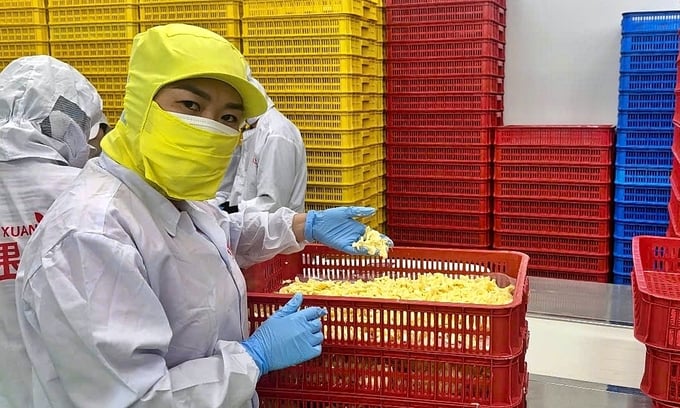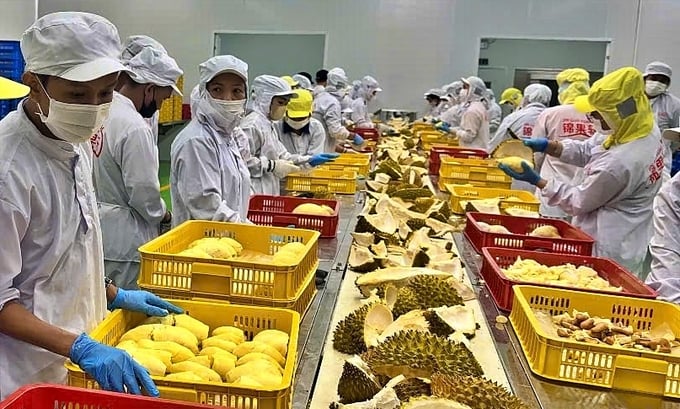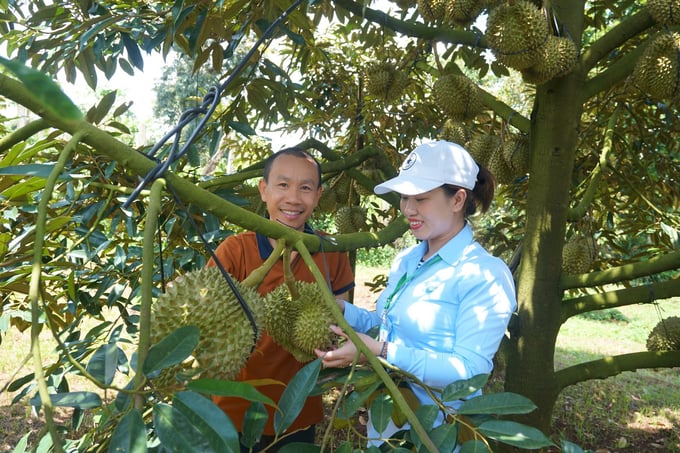June 18, 2025 | 19:41 GMT +7
June 18, 2025 | 19:41 GMT +7
Hotline: 0913.378.918
June 18, 2025 | 19:41 GMT +7
Hotline: 0913.378.918

Ms. Phan Thi Men at the frozen durian processing area. Photo: Bao Thang.
On the afternoon of August 19, the Ministry of Agriculture and Rural Development of Vietnam and the General Administration of Customs of China (GACC) signed a protocol at the Great Hall of the People in Beijing. The protocol pertains to the inspection, plant quarantine, and food safety of frozen durian that is exported from Vietnam to China. This event represents a significant turning point for the durian industry, with the potential to generate an additional USD 400 to USD 500 million in export revenue by 2024. Furthermore, the new product will contribute to the diversification of processing methods, the alleviation of the harvest season's pressure, and the generation of increased added value for the durian industry.
Challenges accompany opportunities. The SPS Vietnam Office has stated that frozen durian will be subject to rigorous inspections and supervision by China's Food Safety Law.
The most recent standard (GB 2763-2021) was released by the State Administration for Market Regulation of China at the conclusion of 2021. This is a national standard that specifies over 10,000 MRLs for 564 pesticides in a list of 376 food items. It regulates the maximum residue limits (MRLs) of pesticides in food. The number of pesticide categories in the new standard has increased by nearly 20% in comparison to the old GB2763-2019 standard, with nearly 3,000 additional MRLs (equivalent to more than 40%). It is important to note that the quantity of pesticides and MRLs is nearly double that of the corresponding CODEX standards.

The entire process of processing frozen durian must comply with HACCP standards or equivalent. Photo: Bao Thang.
China has prioritized the quality of imported food since 2022 by issuing and enforcing Orders 248 and 249. The most recent GB 2763-2021 standard has established over 1,700 MRLs for nearly 100 pesticides that are not registered for use in China, based on these criteria.
SUTECH Science and Technology Consulting Co., Ltd.'s General Director, Ms. Phan Thi Men, emphasized that China is no longer an easy market. She stated that the standards for frozen durian are significantly more stringent than those for fresh durian, necessitating that manufacturers adhere to HACCP or equivalent standards, including ISO 22000:2018, BRC, and FSCC 22000.
Frozen durian processing facilities must be capable of preventing the presence of microbial, yeast, and fungal hazards in the raw materials at the time of harvest. The transportation process must be completely secure and prevent the product from becoming waterlogged or rotten.
Particularly, it is imperative to mitigate and prevent the hazards associated with pesticide residues, heavy metal residues, and other residues that persist from cultivation. To prevent contamination with bacteria such as E.Coli and Salmonella, which can result in diarrhea, food poisoning, and other ailments, the process of segmenting, seeding, pureeing, and freezing necessitates a high level of management to prevent biological, chemical, and physical hazards.
One of the recommendations that SUTECH provided to factories is to guarantee a one-way principle. To prevent cross-contamination during processing, the entry path for raw materials and the departure path for finished products must not be identical.
As per General Director Phan Thi Men, China frequently prioritizes pest control measures for six hazardous organisms on fresh fruit in fresh durian packaging facilities, as stipulated in the signed protocol. Physical methods, such as manual treatment, washing, or blowing, must be employed by packaging facilities to address vermin.
In the interim, the facility must guarantee a standardized and closed process for frozen durian packaging, which encompasses the entire process from the management of raw materials to the final product stages.
Before entering the production process, workers must don protective apparel, including sanitized uniforms, safety hats, gloves, and masks, to prevent the infiltration of dust, hair, or other contaminants into the product.

Ms. Phan Thi Men advises people on how to grow durian. Photo: Bao Thang.
Furthermore, employees are required to adhere to stringent food safety regulations, identify hazards, and implement preventive measures to mitigate potential risks at each stage of the production process. It is mandatory to maintain a ledger or record of batch history, whether through traditional methods or electronically.
The final product must be frozen swiftly and deeply, and its flavor and quality must be preserved throughout the transportation process until it reaches the consumer. The cold storage for frozen durian must also adhere to the necessary freezing standards of -45 degrees Celsius. "The product after processing must be kept cold throughout the entire transportation process until it reaches the consumer," Ms. Men clarified.
In 2022, an export license was granted to China for Vietnamese fresh durian. Vietnam's fruit and vegetable exports have consistently achieved new milestones as a result of the product's market opening. The industry is anticipated to generate approximately USD 7 billion in export revenue by 2024.
Ms. Phan Thi Men stated in an interview with Vietnam Agriculture News that it is imperative to increase the proportion and quantity of profoundly processed products to sustain the momentum of increasing export revenues.
"Until now, Vietnam has had the advantage of exporting raw products. However, the seasonal nature of our agricultural products has resulted in the majority of our fresh fruit only reaching border provinces such as Guangxi and Yunnan," Ms. Men observed. She also mentioned that this could change with processed products, which can be preserved for extended periods.
When that occurs, Vietnamese fruits and vegetables could expand their market reach to include northern Chinese provinces such as Beijing and Shanghai, as well as additional markets like the Russian Federation or Japan, by capitalizing on the advantages of maritime routes.
General Director Phan Thị Mến is delighted by the official exportation of frozen durian and sees it as a sustainable, long-term solution for farmers who may encounter difficulties in producing uniformly high-quality durians or whose fruit fails to meet the required number of lobes or appearance standards. Additionally, Vietnamese enterprises are able to broaden their customer base by utilizing frozen durian.
Despite the numerous opportunities for frozen durian to grow and expand, Ms. Mến is apprehensive about the new prospects, as a result of the high demand for this product in China.
In his capacity as a consultant, the leader of SUTECH Company recommends that enterprises and farmers promptly "establish an internal traceability process." This is a mandatory step in the HACCP compliance process, which facilitates the simple traceability of product batches to the specific growing regions in Vietnam.
Furthermore, importers can trace the product back to the specific farm by utilizing cultivation logs, care history, fertilization processes, and pesticide usage in the event of any violations of food safety and sanitary regulations. This information can also be utilized by government agencies to enhance the administration of food safety and the traceability of products.
Significant export potential is attributed to frozen durian, which includes whole durian (with the rind), pureed durian (without the rind), and durian flesh (without the rind). One container of frozen durian can be worth 2 to 2.5 times more than fresh durian, according to certain merchants in the durian industry.
Translated by Linh Linh
/2025/06/17/2344-1-131758_261.jpg)
(VAN) Amid tariff risks and growing trade barriers in the U.S. market, Australia is emerging as a promising destination to sustain the growth momentum of Vietnam's shrimp exports.
/2025/06/17/2013-1-nongnghiep-112009.jpg)
(VAN) This notable growth trend reflects the global taste for fresh, nutritious fruits and the expanding use of lychees across various sectors.

(VAN) The political and cultural insulation of Japan’s beloved grain is falling apart, and experts warn the country’s relationship with the staple will have to adapt.

(VAN) Noting risks, report examines impacts of avian influenza, changing trade patterns since 2022, fish fraud, and shipping industry’s net-zero goals.

(VAN) Mr. Tran Quang Bao, General Director of the Forestry and Forest Protection Department, met and worked with the International Wood Products Association to promote cooperation in the field of timber trade.

(VAN) China's outbound shipments of rare earths in May jumped 23% on the month to their highest in a year, though Beijing's export curbs on some of the critical minerals halted some overseas sales.

(VAN) To sustain capital flow, administrative reform alone is not enough; what farmers truly need is an ecosystem where both government and businesses grow together in support.